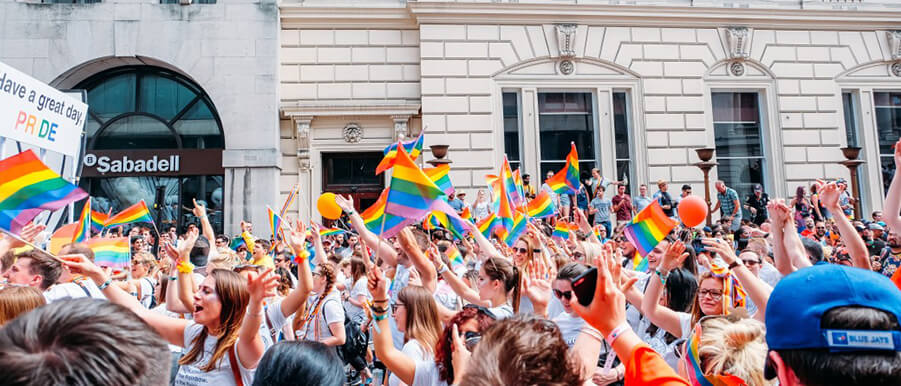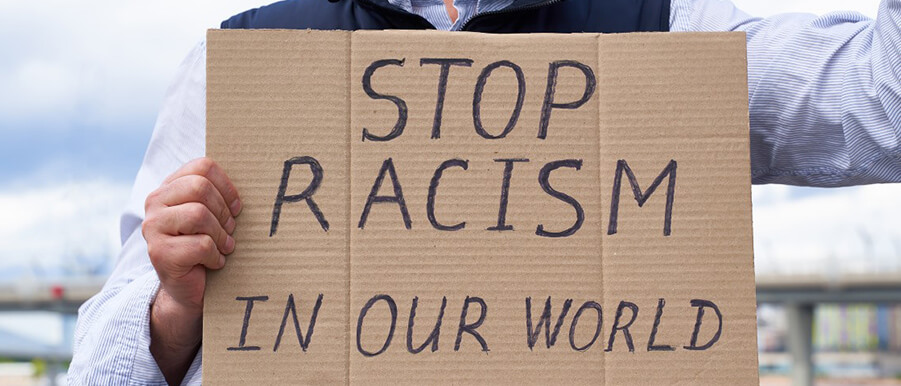 17 Jul 2020
17 Jul 2020
BY: admin
Relationships
How to Talk to Your Children About Racism
How to Talk to Your Children About Racism
After the murder of George Floyd and the 2020 Black Lives Matter protests, all of us have reevaluated our own beliefs and become more aware of how deeply racism still impacts people today. Society is changing, and for many, America feels unstable and, as a result, unsafe.
Parents want nothing more than to give their children a peaceful, prosperous upbringing, but that feels difficult now with social justice and political conversations entering every sphere of life.
Talking to your children about racism is important for several reasons; for small children, it helps combat the development of implicit biases many of us grew up with and had to unlearn. For older children, it gives them a safe environment to ask questions, explore their thoughts and be guided toward an educated worldview.
It’s okay not to have all the answers, but that is not a reason to avoid the topic. By addressing racism at home, you can help your children feel understood, be more inclusive and grow up to be people who are able to stand up for equality and combat racial injustice.
When does racism begin?
Babies become aware of physical differences such as skin color as early as 6 months old. By age 5, children begin to show early signs of racial bias and preferences. This can evolve through a number of ways, including subconscious social conditioning in schools and predominant exposure to only one particular race in the media.
Children are far more aware of racism than parents think; it’s a part of society that they are exposed to at an early age. The goal for parents today should be to teach their kids how to combat racism by modeling and promoting inclusivity and celebrating diversity.
Children Under 5
For preschoolers and kindergarteners, it’s important to adapt to their emerging tendency of noticing differences. As they get older and more vocal, toddlers and young children are likely to ask questions or make observations. The old traditional response to this natural curiosity was to chastise or shush children whenever they pointed out a racial difference.
Although parents likely thought this was disapproving of the behavior, it actually creates a negative connotation with racial openness and curiosity. Rather than seeing diversity as something interesting, children receive the message that it is taboo and different equals bad.
You can create a more inclusive environment at home by introducing your child to more diverse toys and media. For example, buy a White, Black and brown baby doll for them to play with. Watch movies and read children’s books that feature Black, Asian and Hispanic main characters. When they ask questions, provide answers and listen to their thoughts. Focus on fairness and sending the message that we are all wonderful and equal no matter what we look like.
Elementary and Middleschoolers
Children in this age group are likely already familiar with the concept of racism. They may already have heard about it from peers, seen it on news or read headlines online. The internet can be a valuable tool, but it can also expose children to biased, sensitive and even graphic material that they are not yet ready to confront. Rather than being able to analyze and decide whether it’s valuable to them, children tend to perceive everything they read online as fact.
Use the web together to explore various media that discuss racism at an appropriate level. BrainPop is an educational platform that offers free resources to promote an antiracist education. Materials are divided by age and cover both historical events and figures such as Harriet Tubman, Jim Crow, Martin Luther King Jr., slavery and the Black Lives Matter movement.
Teens
Teenagers today are impassioned and politically aligned far earlier than their parents and grandparents were. Talk to them about their views, listen to their concerns and find ways to help them be a safe and peaceful activist. You should also tap into their emotions and ask them how they’ve been handling these events and the feelings they stir up. Anxiety, depression, frustration and fear are all normal and natural responses, but they need to be addressed with care.
Educate Yourself First
You may not even know how to start talking about racism because you have your own questions. The subject is so emotionally charged today that many people want to avoid it altogether. There is no perfect answer or cut-and-dry solution for discussing racism at home, but the best conversations come from a position of education and intellectual curiosity.
Start by reading up on the history of racism yourself. Read material by Black and other minority authors. And address your own stress, frustration and anxiety about the state of the world with people you trust. For some, the best source is a licensed therapist who knows how to guide conversations about difficult or challenging topics.
If you would like personal tips on how to talk to your children about racism, or if you need a safe space to confront your own struggles and concerns, we’re here for you. Contact Caring Heart Counseling today by clicking the button below.
 15 Jul 2020
15 Jul 2020
BY: admin
Relationships
Five Fun Family Road Trips from Denver
Five Fun Family Road Trips from Denver
Although the coronavirus has changed the way we travel and enjoy vacations, there are still adventures your family can have that keep everyone safe. To reduce the spread of COVID-19, it’s best to avoid any crowded areas with heavy foot traffic such as hotels and theme parks, even those that are open to the public. Instead, take in some of the gorgeous sights Colorado has to offer by planning a family road trip to some of these breathtaking locations a short drive from Denver.
Yellowstone National Park
The trip from Denver to Yellowstone is approximately 10 hours, making it the longest road trip on this list. If your family has a camper or RV, this is a great time to use it. The kids can unwind, play games and have fun during the ride while you take turns driving and enjoying the scenery unfold around you.
The fastest route to Yellowstone from Denver is via Interstate 25 and Interstate 80. On this trip, you’ll move through the picturesque Rockies and roaming landscapes teeming with nature and wildlife.
Great Sand Dunes National Park
Around 250 south of Denver lies America’s tallest sand dunes. You’ll feel like you’ve been transported to an exotic, faraway land as you gaze upon the dunes. Take a family hike or even go sand sledding; this is an excellent spot to practice safe summer social distancing while still getting to experience something new away from home.
You can cut through Colorado Springs on your journey, which lasts around four hours. If you head out early, this is a great one-day road trip that will have the kids excited all morning and sleeping on the way home.
Rocky Mountains
The Rocky Mountains are one of Colorado’s most beloved natural monuments with numerous hiking trails, scenic routes and wildlife. The Trail Ridge Road is a 48-mile highway that stretches through the mountains and peaks at 12,183 feet. A designated All-American Road, Trail Ridge offers your family ample opportunity to stop and pause to appreciate the view.
The Rocky Mountain National Park driving experience takes your family on an incredible journey surrounded by incredible landscapes and diverse ecosystems.
Glenwood Springs
Driving from Denver to Glenwood Springs will take you through Keystone, Copper Mountain and past the Arapaho and Roosevelt National Forests. The trip spans around two and a half hours, making it ideal for those who enjoy scenic trips but not long car rides. Families with babies or small children will especially benefit from this rewarding but comfortable road trip.
Once you reach Glenwood Springs, you can visit the famous Hanging Lake, which is currently open with social distancing restrictions. The family may simply enjoy taking the trip, singing their favorite songs and basking in the landscapes around them.
Santa Fe
A road trip from Colorado to New Mexico makes an excellent weekend getaway. The adventure features plenty of scenery, wildlife and beautiful canyons that illustrate the diversity of both states. The distance from Denver to Santa Ve is around six hours and features plenty of small towns, museums and historical sights in between.
When planning your family road trips, make sure that you plot an itinerary and check the current restrictions for every destination. Getting out in the sunshine is important even during the coronavirus, and road trips offer a safe way to travel that puts nature right in front of you.
 06 Jul 2020
06 Jul 2020
BY: admin
Counseling
Online Counseling for the LGBTQ+ Community
Online Counseling for the LGBTQ+ Community
The LGBTQ+ community experiences mental health problems more frequently than other populations. Anxiety, depression, body dysmorphia and many other symptoms are common, but there is a fear among people who need counseling that their therapist may not understand their experiences or approve of their identity. Online counseling during COVID-19 has made finding professional support easier and more convenient than ever; at Caring Heart Counseling, we offer virtual therapy to everyone, including affirming LGBTQ+ care.
What LGBTQ+ Therapy Looks Like
A therapist must understand that everyone’s culture, background and individualized experiences make their mental health unique. No two people experience depression the same, and it’s especially important for us to recognize the unique factors that impact an LGBTQ+ person’s mental well-being.
There is often what is known as a “dual stigma” among people in the LGBTQ+ community. In addition to being judged for their sexuality and/or gender identity, people also face the fear of ridicule for their mental health struggles. There are numerous challenges and emotionally charged experiences that arise as a LGBTQ+ person comes out to their family and learns to own their identity; online counseling can help you build a support system and begin to find strength as you work through your own difficulties.
Caring Heart Counseling does not see your LGBTQ+ experience as something to gloss over; we want to help you work through your thoughts and emotions surrounding your sexuality, gender and identity. Whether you are questioning or unsure how to accept yourself despite identifying as LGBTQ+, we are here to listen and support you.
Affirming, Non-Judgemental Counseling
Therapy is a safe space for everyone to share their thoughts and feelings. It can be especially intimidating for an LGBTQ+ person to reach out because they worry their therapist may not accept them for who they are. This is a valid concern, but we can assure you that every therapist at Caring Heart Counseling accepts, respects and affirms your identity.
It is our job to help you not only work through your unique LGBTQ+ experiences but also cultivate a life you find meaningful. This means finding ways to align your truest self with your highest potential, embracing your strengths, overcoming weaknesses and learning how to take power back from your worst experiences.
Whether you struggle with depression, anxiety, body image or just need someone to talk to, we are here to listen. Online therapy means you can access one of our counselors whenever you need them; we can arrange a phone call or set up an appointment via email. Our flexible hours and a variety of platforms make it easy for you to schedule counseling at a time that is most convenient and comfortable for you.
If you would like to learn more, please reach out and contact us today. We are more than happy to answer any questions you have about therapy and our LGBTQ+ counseling services. Together, we can determine whether Caring Heart is right for you and match you with the counselor best suited to your personality and needs.
 01 Jul 2020
01 Jul 2020
BY: admin
Counseling
Can Racial Trauma Cause PTSD?
Can Racial Trauma Cause PTSD?
Following the murder of George Floyd, America has been forced to address a long-standing history of racial injustice and discrimination. Many people have only just begun to listen, but the Black community has been speaking up for years. Now, they have a greater voice than ever, but with that attention comes an incredible amount of pressure. Emotional trauma from racial discrimination is finally being acknowledged, but where do you go to start healing?
Being Black in America is a stressful, anxiety-ridden experience on my fronts; parents fear for their children’s lives every day, and individuals experience shaming, ridicule and discrimination throughout life. Racial-based trauma can lead to a variety of mental health symptoms and conditions including depression, anxiety and post-traumatic stress disorder (PTSD).
What is Racial Trauma?
Black and POCI people have faced systemic injustices for centuries; cultural conditioning has resulted in hundreds of microaggressions that lead to chronic stress and anxiety. From fear of being pulled over and arrested unjustly or facing workplace discrimination or harassment, Black people have always been forced to live differently.
For LBGTQ+ and transgender Black people, the rate of discrimination and targeted attacks is even worse. In virtually every aspect of their life, ethnicity plays a factor in how they are treated, perceived and ultimately valued.
The result of this ongoing trauma includes physical and psychological effects, many of which share symptoms with PTSD. Hypervigilance, avoidance, anxiety attacks, flashbacks and nightmares are all common experiences that have been silenced for far too long.
At Caring Heart Counseling, we are committed to helping members of the Black community heal and grow from their experiences; we strive to use our own skills and platform as a voice for the underserved, and we want to not only help you overcome racial trauma but transform your pain into a powerful testament to the BLM movement.
How We Treat Racial Trauma
Social and cultural context are two of the most important aspects of addressing racial trauma. Even if you do not meet the diagnostic criteria for PTSD, your experiences are real, valid and deserve to be acknowledged for exactly what they are. We are here for you, and we want to help you find strength in your story.
Education is the cornerstone of our own treatment; we know that we have to learn and continue to amplify Black voices to become more understanding and empathetic therapists. Our entire team is committed to continually providing expert therapy and counseling to members of the Black community.
Together, we can work through this historic movement while resolving pain from the past and building hope for the future. Together, we will stand with you now and in the future with unlimited support, compassion and guidance.

